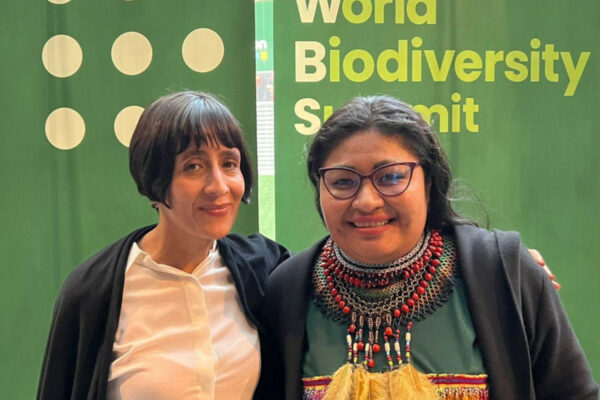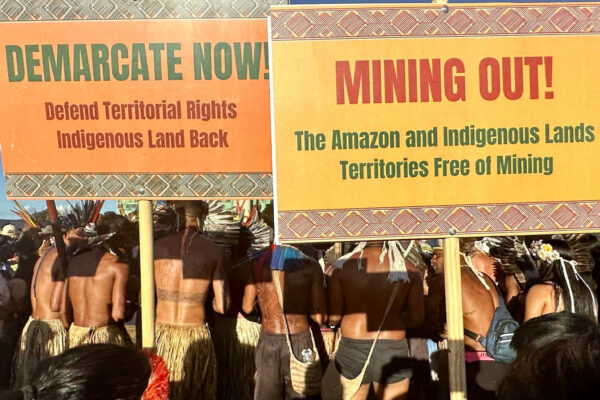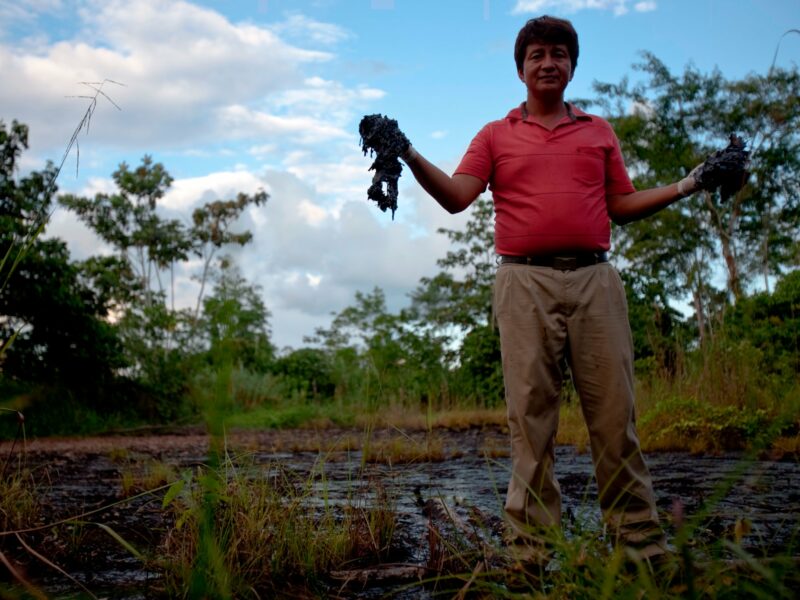ECUADORIANS IN SAN RAMON
WHAT: News Conference
WHEN: 11 a.m. today
WHERE: San Ramon Community Center, 12501 Alcosta Blvd.
Local supporters of the Ecuadorian delegation will meet, and a march to the ChevronTexaco headquarters will follow the gathering.
MELISSA BLOCK, host: A small court in the backwaters of the Amazon in Ecuador could soon be the stage for a $1 billion lawsuit against the second-largest US oil company. Lawyers representing 30,000 Indians there are suing ChevronTexaco, accusing the company of dumping huge amounts of toxic wastewater and crude oil in the Amazon rain forest during the 1970s and ’80s. Supporters of the Indians brought some of the Ecuadorans recently to ChevronTexaco’s hometown, San Ramon, in the San Francisco Bay Area. NPR’s John McChesney reports.
JOHN McCHESNEY reporting:
Look dramatically out of place and a little shy, 12 of the Ecuadorans met with reporters in upscale suburban San Ramon. As promised by the organizers, traditional indigenous attire provided great visuals for television, including a striking circular headdress adorned with green parrot feathers and a delicate orange feather piercing a nose, but when the Indians spoke, there was nothing shy about their presentation.
Ms. ROSA MARINO(ph): (Foreign language spoken)
McCHESNEY: Forty-three-year-old Rosa Marino is from the village of San Carlos. The translation is provided by Leila Salazar of Amazon Watch, an environmental group that brought the Indians to the United States.
Ms. LEILA SALAZAR (Amazon Watch): I want to say to Texaco, now ChevronTexaco, to clean up what it left in the Amazon, to pay us and compensate us for our troubles, our suffering and to never come back to Ecuador.
McCHESNEY: The Indians took a letter to ChevronTexaco’s headquarters requesting an audience with the CEO. The lawsuit alleges that widespread health problems resulted from water and land polluted by oil and toxic waste brought to the surface by drilling and stored in ponds throughout the region. This suit had dragged on in US courts for nearly 10 years. Then last August, a US Court of Appeals said that Ecuador was the proper venue for the case. Steven Danzinger is one of the lawyers representing the Indians.
Mr. STEVEN DANZINGER (Attorney): When Texaco went into Ecuador, they made a critical decision to forgo the installation of what’s called reinjection technology. That basically means that the byproduct of oil extraction which is toxins, carcinogens, is usually put back into the ground into a different cavity of the same well.
McCHESNEY: Instead, Danzinger says, the byproducts were stored in unlined ponds and then seeped into streams and rivers where people bathe and get their drinking water. Such surface storage of wastewater was outlawed in the United States years ago, and the plaintiffs say the same standards should have been used in Ecuador. But company spokesman Chris Gidez says the company obeyed Ecuadoran environmental laws.
Mr. CHRIS GIDEZ (Spokesman, ChevronTexaco): And it used practices that were consistent with accepted industry standards of the time, and the standards are different in every country.
McCHESNEY: ChevronTexaco also says that it spent roughly $40 million on a cleanup of the region in the 1990s, a cleanup that was sufficient to solve any remaining problems, but Steven Danzinger says the cleanup left behind 350 toxic sludge ponds.
Mr. DANZINGER: So there needs to be a wider cleanup of the environment. There needs to be medical care given to the people who’ve gotten sick from oil-related diseases and there needs to be compensation for people for economic losses.
McCHESNEY: Company spokesman Chris Gidez says the drilling wastewater and sludge did not cause the health problems, the skin rashes, stomach disorders and cancer described by the plaintiffs.
Mr. GIDEZ: Over the 10 years of this litigation, the plaintiffs have yet to present any credible substantiated scientific evidence to support their claims. And, in fact, in their press release, they even acknowledge that there is no comprehensive study.
McCHESNEY: What the press release does say is that ChevronTexaco should pay for a comprehensive epidemiological study of health problems in the region. The plaintiffs have argued for years that the trial should be held in the United States because Ecuadoran courts are not equipped to deal with the complexities of the case. Having lost that argument, the plaintiffs now say that the political climate and environmental laws in Ecuador have improved significantly in recent years, so they believe they have a better shot there. ChevronTexaco all along wanted Ecuador as a venue. In any case, the US court in an unusual ruling said that any finding against ChevronTexaco would be enforced in the US. John McChesney, NPR News, San Francisco.













